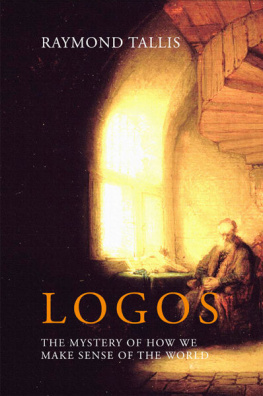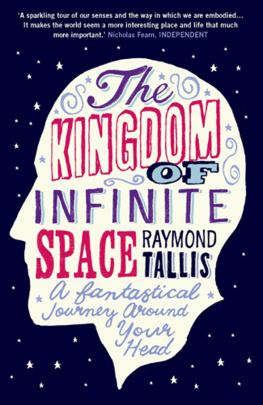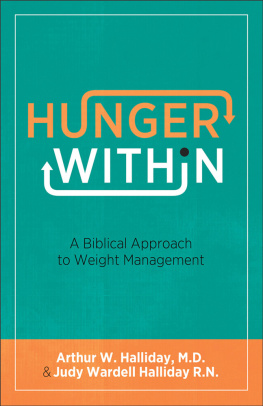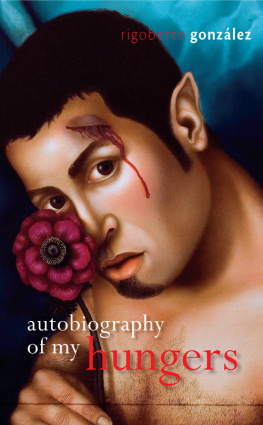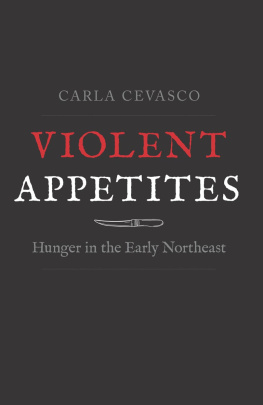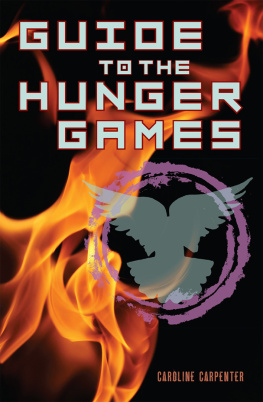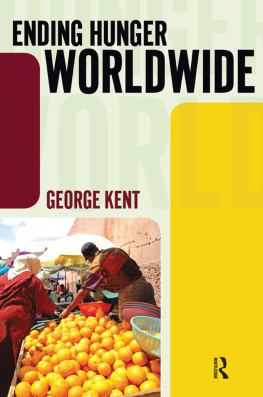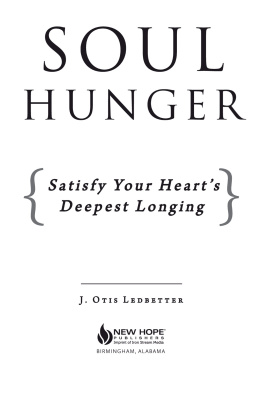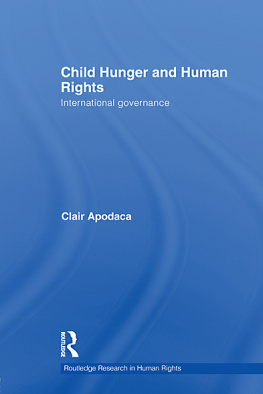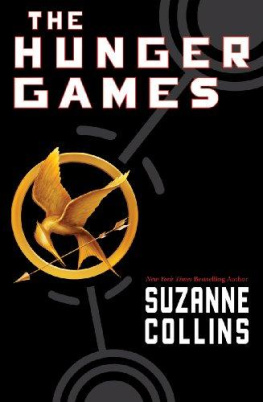Hunger
THE ART OF LIVING SERIES
Series Editor: Mark Vernon
From Plato to Bertrand Russell philosophers have engaged wide audiences on matters of life and death. The Art of Living series aims to open up philosophys riches to a wider public once again. Taking its lead from the concerns of the ancient Greek philosophers, the series asks the question How should we live?. Authors draw on their own personal reflections to write philosophy that seeks to enrich, stimulate and challenge the readers thoughts about their own life. In a world where people are searching for new insights and sources of meaning, The Art of Living series showcases the value of philosophy and reveals it as a great untapped resource for our age.
Published
Clothes John Harvey
Deception Ziyad Marar
Fame Mark Rowlands
Hunger Raymond Tallis
Illness Havi Carel
Pets Erica Fudge
Sport Colin McGinn
Wellbeing Mark Vernon
Work Lars Svendsen
Forthcoming
Death Todd May
Middle Age Chris Hamilton
Sex Seiriol Morgan
Hunger
Raymond Tallis
First published 2008 by Acumen
Published 2014 by Routledge
2 Park Square, Milton Park, Abingdon, Oxon OX14 4RN
711 Third Avenue, New York, NY 10017, USA
Routledge is an imprint of the Taylor & Francis Group, an informa business
Raymond Tallis, 2008
This book is copyright under the Berne Convention.
No reproduction without permission.
All rights reserved. No part of this book may be reprinted or reproduced or utilised in any form or by any electronic, mechanical, or other means, now known or hereafter invented, including photocopying and recording, or in any information storage or retrieval system, without permission in writing from the publishers.
Notices
Practitioners and researchers must always rely on their own experience and knowledge in evaluating and using any information, methods, compounds, or experiments described herein. In using such information or methods they should be mindful of their own safety and the safety of others, including parties for whom they have a professional responsibility.
To the fullest extent of the law, neither the Publisher nor the authors, contributors, or editors, assume any liability for any injury and/or damage to persons or property as a matter of products liability, negligence or otherwise, or from any use or operation of any methods, products, instructions, or ideas contained in the material herein.
ISBN 13: 978-1-84465-155-9 (pbk)
British Library Cataloguing-in-Publication Data
A catalogue record for this book is available from the British Library.
Designed and typeset by Kate Williams, Swansea.
Contents
I am very grateful to Mark Vernon and Steven Gerrard, without whom this book would not have come into being, and for their enthusiasm and support during its composition. I am also grateful to Kate Williams for her scrupulous and careful copy-editing.
The complex history of humanity and of our individual lives is most essentially the history of our hungers, and our endeavours to satisfy them. Our accidental and accident-prone lives begin not with a cry of joy, or of surprise at our existence, but of need. From our first breath to our last we are enclosed in a fundamental existential truth: that there is a gap between the state we are in and the state we would like to be in. Hunger is the experience of that gap, from which arises our misery and our joy, our hope and our despair, our wretchedness and our glory.
Any investigation of hunger conducted at the appropriate depth will quickly widen into an enquiry into human nature and the relationship between humanity and nature. It will soon be overwhelmed by the seemingly limitless variety of the pangs felt by the human animal. The nature of hunger its objects and its subjective content varies dramatically through our lives. The voracious infant raging at the empty breast will grow up into a person hungry for pleasure, success, self-esteem, power, possessions, or even for a life that seems to have a deeper or more coherent meaning. To be human is to be hungry, yes, but it is also to change hunger from a given by which we are defined to needs, passions, desires, by which we define ourselves.
Many, in some cases most, of the hungers that occupy our lives are not seen in the natural world. Even the given hunger biological hunger is transformed. At the very basic level, the fact that, as Marx and Engels pointed out, we produce the means of our subsistence, places eating at a great distance from animal feeding; and when we starve, the causes are as likely to be political as natural, to have their origins within the actions of our fellow men rather than in the processes of nature. If I were to identify the most important message of this book it would be this: notwithstanding the chastening effects of biological hunger, we humans are not to be understood in biological terms.
To this extent Hunger is a small act of resistance against the increasingly strong tide of opinion that human beings are at bottom just animals and they are at top what they are at bottom. A convergence of evolutionary theory, neuroscience and other biological disciplines has led countless thinkers to claim that we are best understood as organisms whose entire panoply of behaviour is directly or indirectly related to organic survival. The human being, we are told, is a phenotype just as in thrall to the survival of the selfish genome as an ape, a frog or a cockroach. If we are distinguished from other members of the animal kingdom, it is only a matter of our greater complexity; and, more specifically, of our ability to deceive ourselves into thinking that we have free will and that we act for reasons other than individual or group self-interest dictated by instincts.
Unfortunately, this biologism seems to have common sense and honesty on its side. The shallow knowingness that sees human hungers as essentially unreformed animal instincts as being, or boiling down to, physiological hunger is, however, wrong for a variety of reasons.
First, it overlooks the extraordinary achievements of humanity. The meanest artefact, the least complex communication, the most trivial everyday decision, the most commonplace of thoughts, goes way beyond anything seen in the animal kingdom, tapping into an almost boundless nexus of ideas, concepts, shared memories and layers of self-consciousness. One does not have to invoke symphonies, cities and the great monuments of knowledge, such as biomedical science itself, to encounter the yawning gulf between ourselves and beasts. A reflection on how, when and with what accompanying feelings we greet or withhold a greeting from someone with whom we sit down to eat is sufficient.
Secondly, biologism undermines hope for a better future. The link between animalist accounts of humanity and nihilistic despair has been increasingly clear over the past two centuries. Its most prominent recent manifestation is in some strains of Green thinking, where human beings are regarded as vermin that have over-run the planet and deserve the fate of other vermin before them. This link is most clearly exemplified in the hugely popular writings of the philosopher John Gray, for whom planet earth has been doomed by the arrogance of human beings ( Homo rapiens ) who fail to acknowledge their status as animals, believe that they have access to scientific truth and fantasize that they can alter things for the better. This attitude of contempt for the intellectual, technical and political achievements of mankind is, if it is taken seriously, dangerous as well as wrong. Grays assertion that man is just an animal (and a rather nasty one at that) leads him to the conclusion that Homo rapiens is only one of very many species and not obviously worth preserving (Gray 2002: 151). It may be alarmist to suggest that Grays ideas are anything other than the idle musings of a misanthrope, but it is important to remember that when human beings in particular regard human beings in general as animals, they may be inclined to treat one another even worse than hitherto in the domestic, local political and geopolitical spheres. One consequence of this is that those who are hungry are more likely to remain so.


